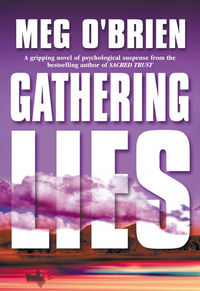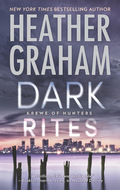Kitap dosya olarak indirilemez ancak uygulamamız üzerinden veya online olarak web sitemizden okunabilir.
Kitabı oku: «Gathering Lies», sayfa 4
Kneeling cautiously next to Dana, I checked her injured arm. The cut was four inches long and covered with plaster dust. That helped to staunch the bleeding, but the dirt and dust of years that had fallen with it weren’t good news.
“It doesn’t look too bad,” Dana said shakily, wincing at my light touch. “I think we lucked out. Sarah, your face is cut.”
Grace spoke from behind us, her tone sharp. “We can’t stay in here. There’ll be aftershocks.”
“Dana’s arm has to be cleaned,” I said, helping her up, then repeated, “It needs to be cleaned.”
I was on automatic, operating out of shock as my mind searched frantically to remember what I’d learned in all the earthquake preparedness meetings at the Justice building. I knew we had to get out of the house, but nothing made sense at the moment except to clean Dana’s wound. The fact that my own face was bleeding had no effect on me whatsoever.
“You, too, Grace,” I said. “Your nose is bleeding.”
Holding Dana’s good arm, I began to move cautiously with her over the shattered glass toward the downstairs bathroom. The ground started to pitch again.
“Damn it, we’ll be buried alive in here!” Grace yelled, grabbing Amelia and running for the front door.
Dana and I swung around toward the door, but none of us made it. The aftershock felt even more violent than the first tremor, and this time we were thrown to the floor right where we stood. A board with nails in it barely missed my chin. Dana cried out, her face twisting in pain.
Screams issued from the kitchen.
“Timmy!” Amelia cried. “She’s hurt!”
The center stairway from foyer to the upstairs level came crashing down, the spokes below the banister popping free and shooting in every direction like a bundle of Lincoln Logs hurled by an angry child.
Amelia’s voice rose to an hysterical pitch. “Timmy! I’m coming!” She began to crawl toward the rubble of stairs, now a huge pile that rose halfway to the second floor.
“No!” Grace yelled, pulling her back just in time to save her from a flying stair tread full of nails. “You can’t get through that way!”
She gave Amelia a hard shove through the front door, which was hanging by one hinge. The woman landed on her knees in the grass, crying out.
Dana and I made it to our feet and followed. Grace was the last one out, glancing toward the blocked-off kitchen before she stumbled through the doorway. She turned and looked up, on her face an expression of horror. I followed her gaze as the two upstairs levels of the farmhouse slid toward us like the top layers of a wedding cake.
We all turned and ran. From a safe distance we watched in disbelief as the entire mass shuddered, then thundered to a heap on the ground.
When the dust had settled, we staggered numbly to the debris and stared into its mass—boards, pipes, plaster, furniture, clothes and bathroom sinks. The huge chimney had fallen, and though parts of the farmhouse living room walls remained upright, there was no longer a ceiling or a roof. Nothing was left but a pile of rubble and bricks.
It was Dana who pointed out that the ground was no longer shaking. “Do you feel that? It’s stopped.”
We stared at each other, a mixture of relief and fear in each face.
“It’ll start again,” Grace said. “When it’s this big, there are hundreds of aftershocks.”
“She’s right,” I agreed.
I didn’t want to admit how frightened I was. Authorities in Seattle had been warning for years that the Big One was coming, and if this was it, there would be hundreds, perhaps thousands of aftershocks, and possibly even tidal waves, the dreaded tsunamis. I wondered how close the epicenter was.
My gaze swung to the kitchen wing, which was new and one-storied. It was still standing, though windows had popped out and parts of the roof had caved in.
“Listen,” I said.
Grace looked in that direction, her voice sharp. “To what?”
“It’s too quiet in there.”
Everyone turned that way.
“Oh, my God, Timmy!” Amelia cried. She swung around to Grace. “You should have let me go to her!”
“I saved your ass, old lady,” Grace shot back, hands on her hips. “You could be under that rubble with them.”
Amelia flushed, her face red and tear-streaked, hands shaking. “I don’t know who you think you are—”
I broke in. “Stop it, both of you! For God’s sake!”
“It doesn’t look all that bad,” Dana said softly. “They could be okay. But what about Jane and Kim?”
A wave of fear swept over me. Had they—had anyone else—survived?
“Timmy can’t be all right,” Amelia said querulously. “She would be here by now, checking on us. Something’s happened to her, or she’d be here by now!”
We no longer had access from the front. Heading at a run around the side of the house, we made for the back kitchen door. Slowing down as we reached it, Dana held her arm to staunch the renewed bleeding, and Grace rubbed a finger beneath her nose, which only smeared the blood that had been coagulating there. My legs shook, and I could see that Amelia was none too steady. I reached out and took her arm, urging her to lean on me.
The kitchen door stuck, but we were able to force it open despite the objects that had fallen against it. Once inside, the scene stopped us in our tracks. Though parts of the roof were indeed unscathed, there were huge, gaping holes. The entire inside ceiling had fallen, as had the skylight. Glass was everywhere, on cupboards, tables, in the sink, on the floor. Copper pots, which had hung gleaming on the walls only moments before, lay in a pile. Dishes had flown from cupboards and were strewn from one end of the room to the other. The huge stainless steel refrigerator had slid and lay on its side halfway across the room from where it had stood for years. Its door lay open, and jars of home-preserved jams had fallen out and broken. Reddish-purple streams of blackberry and raspberry jam flowed like blood onto the floor.
It was this that caught my attention first. I thought it was blood, and I ran to it, then realized my mistake. At the same time, I heard a moan.
“Quiet!” I yelled at Grace, who was issuing orders to Amelia and Dana to search through the rubble. “There’s somebody here.”
We lifted the heavy appliance together, all four of us at one end, and pushed it out of the way. The person under the fridge was Lucy, and as her condition became clear, Amelia began to cry. “Lucy…oh, poor Lucy.”
I checked her pulse, though it wasn’t necessary. Lucy’s neck was broken, her head twisted at an odd angle to her body. “She’s dead,” I said quietly.
“Poor, poor thing,” Amelia whispered, rocking back and forth on her knees and touching the other woman’s face as if to bring her back to life.
“For God’s sake, woman!” Grace said. “It’s not like she was your best friend!”
Amelia’s breath caught on a sob. She looked around frantically. “Timmy? Where is Timmy?”
“I heard a moan,” I said. “If it wasn’t Lucy—”
We began to toss debris aside, and in a corner we finally found Timothea, semiconscious, her eyes closed.
Amelia gently touched her face. “It’s all right, it’s all right, all right…” she murmured over and over.
I stroked the gray hair back from Timmy’s forehead, which was smeared with blood. Dana went to the sink for a wet rag. When she turned on the faucet, nothing came out.
“Damn!” She rummaged under the sink for bottled water, then in the open cupboards. Finally, she uncovered a bottle in the wreckage on the floor.
“Not too much,” I warned, as Dana wet the rag. She looked at me questioningly.
“We don’t know how long we’ll be without, or how much more we’ll find,” I said. “We’d better ration it.”
Dana nodded and screwed the cap back on the water bottle, handing me the dampened rag. I wiped the blood from Timmy’s forehead, and she opened her eyes. They registered shock, then comprehension, then worry.
“Is everyone all right?” Her voice was shaky, but her grip on my arm was strong.
“We don’t know about Jane and Kim, yet,” I answered. “The rest of us are fine. How do you feel?”
“Sore. Sore all over.” She tried to sit up. “Lucy? She was over—”
I pushed her gently back down. “Just rest, Timmy.”
“But Lucy—”
I shook my head. “I’m sorry. We can’t do anything for her.”
Understanding came over Timmy’s face. “Oh, no. Oh, no. Dear God.” Tears welled in her pale blue eyes.
“We don’t know about the cottages, yet,” I said, “but the entire upstairs and parts of the living room have collapsed. I’m sorry.”
Timmy squeezed her eyes shut briefly, then nodded. “I’m all right. I really am. Help me up, will you?”
“I’m not sure—”
“Just help me up!” she said angrily. Her mouth trembled, as did her entire body. “I have to take care of things!”
She put a hand on my shoulder to pull herself to a sitting position. Reluctantly, I helped her to stand, then turned to Dana and Amelia. “Will you take her outside? Stay with her?”
I turned to Grace. “Come with me and we’ll check out the cottages for Jane and Kim.”
Two hours later there were seven of us on the dark lawn, wrapped in blankets, with salvaged pillows and bottles of water beside us. Just that afternoon there had been ten women at Thornberry. We couldn’t know the fate of the two assistants who had left for Whidbey, but here on Esme Island, one of our number was now dead.
We had wrapped Lucy’s body in a blanket scrounged from the debris, and laid her to rest, temporarily, under what Timmy told us was her favorite tree. We didn’t know how long that “temporary” status might last. There was no law or rescue service on the island, and neighbors in the other three houses on Esme were not usually in residence until summer.
The small battery-operated radio we’d uncovered in the office debris had lasted only a few minutes, and there were no more batteries because Timmy had forgotten to buy extras. Those few minutes, however, were long enough for us to hear that the quake had indeed been the Big One, and that Seattle was in chaos, along with surrounding cities from Olympia in the south to Victoria, B.C., to the north. The quake had been felt, in varying degrees, as far south as San Francisco, and as far north as Alaska.
It was known that the San Juan Islands had been involved, the newscaster had said, based on reports from the U.S. Geological Survey. Helicopters that would ordinarily assess damage to those outlying areas, however, were in use transporting the many wounded and dead in the cities.
As for rescue teams, they had been decimated. Workers who were at home were unable to get to their places of duty, and at any rate were involved in taking care of their own families, many of whom were missing or dead. Buildings and freeways had crumpled, much like those in the 1995 quake in Kobe, Japan. Those who had thought Seattle was prepared for such a disaster were in shock. No one had prepared for this—a 9.1, if it didn’t go up from there when all the reports were in.
The last thing we heard before the radio’s batteries faded was that tsunami warnings had been issued for the entire west coast, from the San Juans south.
I huddled in my fleece jacket and looked around at the other women. We had found Kim and Jane standing in a daze outside their cottages, which had been totaled. The farmhouse, despite its near ruin, seemed to have survived better than any other structure at Thornberry. Even the goat pen had been demolished. The goats had run off.
When the aftershocks stopped, or at least slowed down, we would move inside and begin cleaning up. After that, we would all have to sleep and live in the kitchen until help arrived. We would have to pray it didn’t rain.
Jane was sobbing, terrified for her children and husband in Seattle. She had drawn her knees up in a fetal position and refused to look at anyone. Grace had distanced herself from all of us, and Dana sat quietly, her eyes closed. She didn’t talk about the husband she’d left behind in Santa Fe. Amelia was stone-faced, and in just as much shock as the rest of us, but unwilling to admit it.
I wondered why she had pretended all this time to be just like us—a guest who had been invited but didn’t know anyone here. Clearly, she was closer to Timmy, and even Lucy, than she’d let on. A strange old bird, tough on the outside but with surprisingly deep feelings inside.
Kim Stratton had proven to have more gumption and selflessness than anyone would have expected. Though everything she had brought to Thornberry with her had been buried beneath the ruins of her cottage, she had helped Jane to carry her few salvaged belongings down to the farmhouse lawn. She sat silently, now, her long auburn hair pulled back into a ponytail, her face smeared with dirt and sweat.
As for me, I worried that I might not have a home to go back to now, and I worried that my mom would be going crazy without news. But that was all. I had severed ties with most friends and co-workers after the arrest. Or they had severed ties with me.
There was Ian, of course. Had he survived the quake?
And if so, did he wonder about me?
Not likely. And not that I honestly cared. There had always been something about Ian I didn’t like—even when we were deep into sex, and had been together for months. In bed, I would look up into his eyes, eyes I had always thought were as lovely as a woman’s—long-lashed and ice-blue—and wonder what secrets lay behind them. When he betrayed me, I felt only a small jolt of surprise.
So it was done. Over. Even my impending trial paled in comparison. All that mattered was getting out of this alive.
As I thought that, the ground began to rumble again. Jane buried her face against her knees and sobbed. I and the others hunkered miserably into our blankets, and I thought I knew what they were thinking—the same thing I’d been thinking: Had the end of the world finally arrived?
PART III
4
The morning after the quake, a blood-red sun rose over the Sound, tinting the snowy tops of the Cascade Range. We had spent a miserable and frightening night on the lawn outside the Thornberry farmhouse. Aside from the cold and damp, there were the aftershocks, some of them almost as large as the original quake.
We stirred and began to sit up.
“I thought daylight would never come,” Dana said, rubbing her arms vigorously for warmth. “This has been the longest night of my life.”
I was forced to agree. I had nodded off a few times, only to have nightmares of rolling ground beneath me—nightmares that turned out to be all too real each time I woke.
I stood and shook the blanket from me, running fingers through my hair in a feeble attempt to straighten it. Since I’d cut it, it had grown out a few inches, and a natural curl made it tangle at night.
I’d give my right arm for a shower, I thought. Or to wash my face. But even though the Thornberry kitchen sink stood miraculously untouched, the water line from the well’s reservoir had broken, and the pump no longer worked. Nor could we use the one toilet in the farmhouse that remained standing. Like soldiers on bivouac, we had dug holes in the ground fifty yards into the woods. Grace was responsible for this idea, as well as a large percentage of the work it took.
“I’ll tell you one thing, I’m not going back inside,” Jane said, “not in the farmhouse or anywhere.” She gripped her blanket around her as another aftershock hit. We held our breaths till it was over, time suspended.
Afterward, Jane continued, her voice noticeably shakier. “Aren’t these things supposed to get less and less strong as time goes on?”
“Yeah, and people are supposed to prepare better,” Grace said pointedly to Timmy. “Why the hell didn’t you put away water and emergency food rations somewhere safe? Not to mention more portable radios, batteries, light sticks, camp stoves, propane lamps—” She broke off, cussing. “Where the fucking hell was your head, anyway? One cell phone in the whole damn place? And it’s under rubble now?”
Timmy blanched, but didn’t answer. I thought I saw her lips tremble, but the light wasn’t good so I wasn’t sure. I was about to break into Grace’s diatribe when Amelia did that for me.
“Timmy did her best,” she said defensively. “She couldn’t—”
“Couldn’t what?”
“Hush, Amelia,” Timmy said. “She’s right. Besides, she wouldn’t understand.”
Amelia shot a contemptuous look at Grace and turned away.
Grace shook her head. “You bet your sweet ass I wouldn’t understand. Sure, there are cans of food in the kitchen, but we can’t cook it, now that the line’s broken to the fuel tank. The stove is electric, and the generator’s useless without fuel. Besides that, whatever was in the fridge is spoiled by now. Or soon will be.”
“Well, at least there are plenty of cans of food,” Dana said in a surprisingly irate voice. “We can damn well eat things cold! Besides, there’s plenty of oysters around here. They aren’t bad raw.”
Grace gave a shudder. “And what do we do about water?” She held up a 12-ounce bottle of Perrier. “If these were all we could find last night, I doubt there are many more. Good God, Amelia, if Timmy had spent less on frills—”
“I suppose you have all those things in your own home,” Amelia said angrily. “You’re prepared for anything, no matter what.”
“You’re damned right, I am. It’s not like we haven’t had enough warnings in the past few years, even in New York. Not just about earthquakes, but blizzards, tornadoes, floods. And if you were any kind of friend to Timothea—which it seems you happen to be—or if you were a responsible person at all, you’d have made sure she stocked emergency supplies—”
“Will you two please stop!” Jane cried. She stood and flung her blanket to the ground, doubling her fists. Tears ran down her face. “My children may be dead right now! Do you realize that? While you two are harping at each other, my kids could be dead!”
“All right, that’s it!” I said, standing. “First of all, I’ve just about had it with you, Grace. Maybe you’re right, maybe Timmy could have prepared better. But it doesn’t help to stand around and rant at each other.”
I turned to Jane and put both hands on her shoulders. “Look, I know this is awful for you. But, Jane, we have to focus now on finding a way to communicate with the mainland. The sooner we do that, the sooner we may be able to reach your husband and children. At the very least, a portable radio might give us some up-to-date news. We could find out how things are going down there.”
Jane fell silent, and Dana asked, “What do you have in mind?”
“I’ve been thinking about it all night. There are three other houses on the island. Two, as I remember, are summer cabins. Right, Timmy?”
She nodded. “They’ve sold a couple of times over the years, but both have been vacant quite a while.”
“And the Ford house?”
“It’s still there, of course. The son owns it now, but he only comes out here in the summer.”
“Luke, you mean?”
She nodded again.
So he’s still around. “Any chance he’d be there now?” I asked. “It’s almost summer.”
“I’ve never known him to be here this early,” Timmy said. “And I’m pretty sure he would have let me know he was here, if he was.”
“So unless someone just happens to be visiting those two cabins, we’re the only people on the island, right? Then, what we need to do is check out those cabins, and Luke’s house, and see if they are indeed vacant, and if they survived the quake. If so, they might have some things we can use till help arrives.”
I turned to Timmy. “Two people should stay behind, just on the off chance a rescue party comes by. Do you mind? You and Amelia?”
“Leave the two old ladies behind, is that it?” Amelia said spiritedly. “Not on your life. Leave Jane. I’m as strong as she is.”
“I’m sure you are,” I said, though in truth I doubted it. It wasn’t Amelia’s age that was against her, as many women in their seventies were good hikers. But I’d seen her trembling when she thought no one was looking. It had been a difficult twelve hours, and Amelia needed rest, not the exertion of tramping through the woods. As for Timmy, she had suffered too much loss. To my eyes, she seemed close to breaking.
“I also thought maybe you and Timmy could check out the grounds here,” I said. “See what kinds of vegetables are left in the gardens, like maybe some carrots still in the ground from last fall? Do you mind?”
Amelia hesitated, but looked at Timmy, who seemed very frail, suddenly. “No,” she said, “of course not.”
“Okay, then, let’s get going,” Dana said. “I’m more than ready.”
We all looked at each other for signs of agreement. Kim, who hadn’t yet spoken, said, “Just one thing. Does anyone here have a gun?”
Jane laughed uncertainly. “My goodness, no. Who on earth would have thought we’d ever need one here?”
Dana shook her head, and Amelia raised her white brows and said, “That’s an odd thing to ask.”
“Not if you’ve ever been in an earthquake,” Kim said. “I have.”
“You mean in L.A.?”
She nodded. “The Northridge. People went nuts.”
“But that was entirely different,” I said. “L.A. is a big city. Here, there’s no one else on the island. Only us.”
Kim gave me a weighted look, then flicked her eyes to Grace.
We all followed her gaze.
Grace flushed, then said, “Oh, for God’s sake! I may not be the most patient person in the world, but it’s not like I’m going to kill anyone.”
No one said a word.
Kim Stratton and I made our way along the shoreline to the east, while Dana, Jane and Grace headed west to check out the two cabins. Our plan was to meet at the Ford house, which was in the approximate middle of the island, on the northern shore. The more direct, cross-island path Luke and I had created all those years ago had grown over, and I hadn’t been able to find it from Thornberry. Our trek would take us a bit longer than if the more direct three-mile route had been available, but we thought that if we kept a steady pace, we could be there in less than four hours.
The beach consisted of gray rock, not sand, and was lined with fir and cedar trees. At times we were forced to navigate huge logs that had washed up during storms, and in several places the shoreline came to a dead stop by boulders we had to climb to get where the beach began again.
I was grateful I’d worn my hiking boots, jeans, and a warm sweater and coat to dinner the night before. A quick check of my cottage this morning had revealed most of my belongings were buried beneath debris. There hadn’t been time to see what could be salvaged—nor had I wanted to. My nerves were shot, and I felt exhausted after so little sleep.
Nor could I eat. Timmy and Amelia had put together a breakfast of fruit and found muffins. I had wrapped a muffin in a napkin and had stuck it into my coat pocket for later. Kim and I each carried a bottle of water.
Each of our two groups had an air horn that we’d found in the kitchen pantry, nearly buried by flour sacks. They were one of the few things Timmy had set aside for emergencies—not that she’d expected anything like this, I thought. More likely illness, or an invasion by bear.
Are there bears up here? I suddenly wondered, nervously scanning a thick stand of fir trees. Grizzlies could kill a person with one swat and eat the evidence before anyone was the wiser.
Stop it. Better to worry about these damned aftershocks. Will they never stop?
Unable to steady myself as another one hit, I let it take me to my knees, then flattened myself on the ground. Kim fell prone beside me.
“That one felt stronger than the others,” she said, gripping the ground with her fists. “God help us if the first one was only a foreshock.”
“Don’t even think it.”
If I felt like I’d been through hell in Seattle before coming here, that whole business seemed more like purgatory now—the place Catholics believe you can pray yourself out of, like buying tickets to a fair. This—this not knowing what was going to happen next—was hell.
Or so I thought then, not knowing how much worse things were going to get.
I stood, brushing sharp, gravel-like sand from my knees and palms. As I did so, I felt like screaming—like running into the woods and beating on the ground. The only thing that kept me from doing that was feeling I had to keep up my spirits. If not for my sake, then for Kim’s. Though she probably didn’t need me for that.
On first meeting, Kim had seemed spoiled and standoffish. The two times she did show up for after-dinner coffee, she asked endless gossipy questions about our personal lives. I supposed this was what passed for conversation in Hollywood.
Still, I had to admit that Kim had been proving her mettle, ever since we’d found her outside her cottage yesterday, looking more angry than anything else.
I said to her now, as we began to walk again, “I’m amazed at how you’re taking all this.”
Her tone registered amusement. “Because I’m a star you mean?”
“Well, no…”
But that was exactly what I’d meant. “I guess you don’t seem the type—” I broke off. “Sorry.”
“Oh, hell, it’s okay. You couldn’t be expected to know that in less than two years in L.A., I went through fires, floods, riots, and the worst earthquake disaster to hit California in decades. I was in the Valley filming when the Northridge quake struck. We were all cut off from our homes for days, and the worst part was that when we got home, some of us couldn’t even find our front yards beneath the rubble. Then the rains began.” She gave a low laugh. “God, it was awful. I lost the first house I ever bought with my own money, when it slid down a hill onto Pacific Coast Highway.”
“I’m sorry.”
“Thanks. It was rough. So I guess I’d have to say that so far, this little rocker is a piece of cake.”
I smiled. “I’m glad someone feels that way. But I jumped to conclusions about you, and I don’t usually do that.”
Kim rubbed a smear of dirt from her face. “If it’s any consolation, you’re not the first. C’mon, let’s go.”
This time I followed, watching the dark red ponytail bob ahead of me. After the rosy sunset the night before, the day had turned chilly, the sky spitting rain. Kim wore only the jeans, long-sleeved sweatshirt and Saucony sports shoes she’d had on when the quake struck the day before. They were soaked clear through.
I caught up to her. “Kim, listen. I wasn’t thinking when I asked you to come with me. We should have taken more time to find you warm clothes.”
She smiled. “Guess you’ve never been on location, have you?”
“No. Pretty tough?”
“Try swimming in a creek in Yellowstone when it’s thirty degrees out and starting to snow.”
“Ugh. You must like your work, though, to be so successful at it. They say we thrive the most in the kind of work we love.”
“I suppose that’s true, at least for some. For me, it’s been a long, hard road, getting to where I am now. Some of it I don’t even want to remember.” Her face clouded over. “What about you?”
I started to answer just as we rounded another curve on the beach—only to see another stretch of uninhabited shoreline.
“Damn,” I said. “Where is that house, anyway? I remembered it being closer.”
“You want to rest?” she asked.
I shook my head. “I do need something to eat, though.” Pulling out the poppyseed muffin, I broke it in two and offered one half to Kim.
“Thanks. Listen, let’s sit down a minute so I can take my socks off. There’s so much sand lumped inside them, they’re making my toes sore.”
Holding the piece of muffin in her teeth, she untied her shoes and removed her socks, stuffing them into a pocket. We both sat for a moment, eating silently.
“You’re a lawyer, right?” Kim said, as the final bite of muffin disappeared. She brushed crumbs off her jeans. “A public defender?”
“I was.”
“You were? What happened? Or shouldn’t I ask?”
I gave a shrug. “It looks like we’re going to be on this blasted island together for a while, so sure, you can ask. I was a public defender in Seattle. I lost my job.”
“Cutbacks?”
“No. I was fired.”
She looked at me sharply. “I can’t imagine you doing something bad enough to get fired over.”
“Really? But we hardly know each other.”
“Well, it’s true I haven’t gotten to know you very well,” Kim admitted. “And that’s my fault. Believe it or not, even though I can hang loose in front of a camera, I don’t feel comfortable in groups of women. I don’t seem to have much in common with them, and I never know what to say. But the way you took over yesterday when the quake happened—not getting freaked out or anything—I guess I saw you as being in some sort of responsible job and never doing anything wrong.”
I almost laughed. “Well, you’ve got some of that right. I was in a responsible job, and I didn’t do anything wrong. Somebody set me up for drug possession with intent to sell, and now I’ve got a trial pending.”
“You’re kidding!”
“I wish.”
“But, Sarah, doesn’t being an attorney allow you more of a chance of clearing yourself? You can convince a jury you’re innocent, right? Then you can go back to work?”
“Aye, and there’s the rub…convincing a jury of my innocence.”
Kim nodded and sighed. “I was offered a role like that—an innocent woman, behind bars. I turned it down because my agent didn’t want me to play a prisoner.” She rolled her eyes. “Like people don’t know the difference between real life and acting these days. Laura West, who did take the part—Do you know her?”
“I know of her, of course,” I said. “Julia Roberts’s latest competition, right? Or so it’s said. Personally, I don’t think she can hold a candle to Roberts.”
“I agree. Even so, she won an Oscar for the part of that inmate. I was left to look at it as the road not taken.”
Ücretsiz ön izlemeyi tamamladınız.








